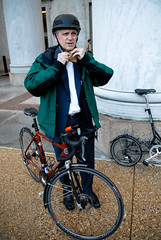The New York Times has published a profile on Portland Congressional Rep. Earl Blumenauer. The story, A Bicycle Evangelist With the Wind Now at His Back appears above-the-fold on page two of the paper’s weekly “Science Times” section.
Unlike the recent anti-bike comments by Rep. John Boehner that got national attention, this story paints a more positive picture of biking as a political issue.
Here’s how the Times characterizes Blumenauer’s work:
But Mr. Blumenauer’s goals are larger than putting Americans on two wheels. He seeks to create what he calls a more sustainable society, including wiser use of energy, farming that improves the land rather than degrades it, an end to taxpayer subsidies for unwise development — and a transportation infrastructure that looks beyond the car.
The article also mentions the work Blumenauer and his colleague Jim Oberstar (D-MN) are doing on Obama’s economic stimulus package (which, depending on who you talk to is either looking like a dream or a nightmare for bike advocates — more on that later):
With an eye on the potential stimulus package, cycling advocates “have compiled a list of $2 billion of projects that can be under construction in 90 days,” Mr. Oberstar said, adding that prospects are “bright.”
Just what is on that list? We know $25 million of it includes a request from Portland to build out 110 miles of “shovel ready” bike boulevards. (We’ll have more on that list soon).
It’s good to see a major media outlet take interest in biking and Blumenauer, and this article also shows the diverse range of issues that biking touches on (from energy to obesity).
However, I cringe whenever people that work on bike issues are portrayed as being “evangelists” or activists (many people assume because I cover biking that I must be an advocate, but I consider myself a journalist first and only an accidental advocate). Biking is simply a transportation issue, but to many people in the media (and in the general public), it’s some type of fringe thing that comes with a group of believers who — like missionaries of a new religion — are trying to convince the rest of America to see the light.



